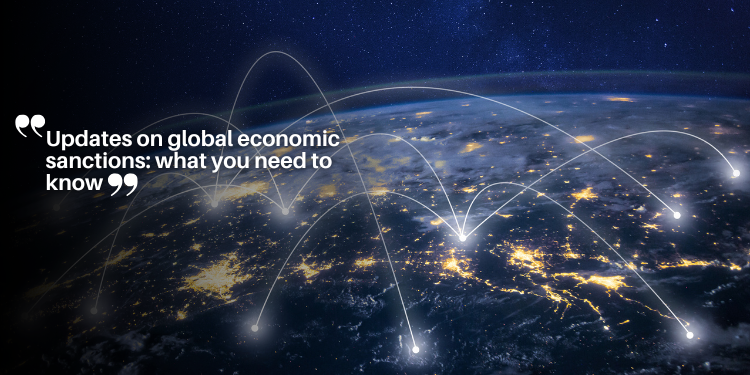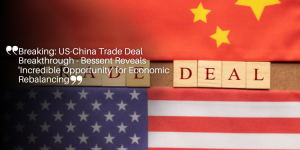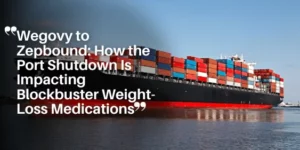Updates on global economic sanctions: what you need to know

Economic sanctions are targeted measures imposed by countries to influence the behavior of others, affecting global trade, supply chains, and diplomatic relations significantly.
Updates on global economic sanctions are crucial to grasp, especially in today’s dynamic political landscape. Have you felt the effects of these changes? Let’s dive into why these sanctions matter.
Understanding global economic sanctions
Understanding global economic sanctions is essential in today’s interconnected world. These measures can significantly influence international relations, trade dynamics, and even domestic economies.
Economic sanctions often serve as a tool for governments to achieve foreign policy goals. They can target specific countries, individuals, or organizations to restrict trade and financial interactions. Understanding their implications requires a look at various aspects, including reasons for their imposition and their impact on global markets.
Reasons for Imposing Sanctions
Countries may impose economic sanctions for several reasons. Here are the most common:
- To respond to human rights violations
- To counter terrorism
- To address aggressive military actions
- To influence political change
These sanctions often aim to compel a change in behavior without resorting to military action. However, the effectiveness of such measures can vary widely.
How Sanctions Affect Economies
The influence of sanctions on economies can be profound. Here are some key effects:
- Disruption of trade flows, leading to shortages
- Inflation due to decreased supply of goods
- Loss of foreign investments
- Increased poverty rates in affected regions
Countries under sanctions may struggle to access essential goods and services, which can lead to severe humanitarian issues. The ripple effects can also hit neighboring nations and global markets.
Another critical aspect to consider is the potential backlash these sanctions create. They can lead to increased nationalism and anti-Western sentiments, making diplomatic relations more complicated.
In summary, understanding global economic sanctions involves recognizing their motivations, the mechanisms of enforcement, and their far-reaching impacts on economies around the world. Grasping the complexities of these measures allows for a better interpretation of international news and developments.
Recent updates on major sanctions
Recent updates on major sanctions reflect the rapidly changing geopolitical landscape. As countries respond to various global crises, these measures have evolved to address new challenges and reshape international relations.
One of the significant updates is the tightening of sanctions against specific nations due to ongoing conflicts. For example, sanctions against Russia have been expanded in response to its military actions. These restrictions aim not just to penalize but also to restore peace by influencing political decisions.
Key Developments
Several key developments have emerged in recent months. Here are a few notable changes:
- Increased sanctions on oil exports from sanctioned countries
- New financial restrictions on banks linked to hostile governments
- Targeting businesses aiding in military supply chains
These focused efforts illustrate how international coalitions are working together to ensure compliance. Additionally, nations are scrutinizing foreign investment in sensitive sectors to mitigate risks associated with sanction evasion.
Impact on Trade Relationships
The imposition of these major sanctions has reshaped trade relationships worldwide. Countries that once relied heavily on sanctioned nations now seek alternative trading partners. This shift is significant as it can lead to economic instability in regions that do not adapt quickly.
Moreover, supply chain disruptions are becoming more common. Industries dependent on imports from sanctioned nations face challenges in securing necessary materials. Companies must find new suppliers and innovate to maintain their production levels.
In conclusion, the landscape of major sanctions continues to change, with new updates shaping how nations interact economically and politically. Keeping informed about these changes helps everyone understand the broader implications for international trade.

Impact of sanctions on global trade
The impact of sanctions on global trade is significant and far-reaching. As nations impose trade restrictions, the effects ripple across economies worldwide. Understanding these impacts is crucial for businesses and policymakers alike.
One major effect of sanctions is the disruption of supply chains. Countries that rely on sanctioned nations for essential goods often face shortages. For instance, industries like technology and agriculture may struggle to source raw materials. This can lead to increased prices and delayed production timelines as companies scramble to find new suppliers.
Economic Consequences
Trade sanctions can also have serious economic consequences for both the targeted countries and the nations enforcing them. These consequences include:
- Reduced foreign investments, making it difficult for businesses to grow
- Increased unemployment rates as companies downsize or close
- Inflation, driven by increased costs of goods and services
As a result, the economies of sanctioned nations can deteriorate, limiting their ability to trade openly with the rest of the world.
Changing Trade Patterns
Sanctions often lead to changing trade patterns. Nations impacted by sanctions must seek new trading partners. This shift can create opportunities for countries that are not part of the sanctioning coalition. For example, nations not aligned with the sanctions may step in to fill the gaps in supply, often at more favorable terms.
Moreover, businesses worldwide need to adapt to new regulations and compliance requirements. Understanding the impact of sanctions on global trade means being aware of potential legal ramifications for companies caught violating these measures. The consequences can result in substantial fines and reputational damage.
The future of economic sanctions and diplomacy
The future of economic sanctions and diplomacy is a crucial topic as global relations evolve. As countries face new challenges, the tools of diplomacy and sanctions will also adapt.
Sanctions have become a popular policy tool, but their effectiveness can vary. Some governments are questioning how impactful these measures truly are. With emerging international threats, it is essential to consider how sanctions can be tailored to address specific situations.
Trends in Sanction Policies
Several trends in sanction policies are becoming evident. These include:
- Targeted sanctions aimed specifically at individuals or companies, rather than entire nations
- Increased use of technology to monitor compliance and enforce sanctions
- Strategic alliances to impose collective sanctions, making them more effective
These developments indicate a shift towards more nuanced approaches in applying economic pressure and achieving diplomatic goals.
Role of Diplomacy in Sanctions
As the landscape changes, the role of diplomacy becomes even more critical. Effective communication and negotiation can lead to more favorable outcomes. Countries now focus on dialogue to resolve conflicts before they escalate to the point of needing sanctions.
Within this context, engaging with international organizations is vital. Institutions like the United Nations can facilitate diplomatic discussions, ensuring that sanctions serve to promote peace rather than provoke further tensions. Additionally, maintaining open channels for negotiation can help prevent the deterioration of relations.
In summary, understanding the future of economic sanctions and diplomacy involves recognizing the shifting strategies in policy making and the importance of dialogue. As global conditions change, the balance between sanctions and diplomacy must be carefully navigated to achieve lasting solutions.
In conclusion, understanding the dynamics of economic sanctions and their future in diplomacy is essential. As nations continue to face complex challenges, the strategies used to address these issues will evolve. Moving forward, targeted sanctions and effective diplomacy will play vital roles in shaping international relations. By balancing these approaches, countries can work toward peace and cooperation while addressing serious issues worldwide.
FAQ – Frequently Asked Questions about Economic Sanctions and Diplomacy
What are economic sanctions?
Economic sanctions are restrictive measures imposed by countries to influence the behavior of other nations, often to address issues like human rights violations or aggression.
How do sanctions affect global trade?
Sanctions can disrupt supply chains, increase costs for businesses, and lead to shortages of goods, impacting global trade dynamics.
What is the role of diplomacy in managing sanctions?
Diplomacy plays a crucial role by facilitating dialogue and negotiation, which can prevent conflicts from escalating and reduce the need for sanctions.
How are sanctions tailored to specific situations?
Sanctions are increasingly targeted at individuals or organizations rather than entire nations, making them more precise and effective in achieving desired changes.







